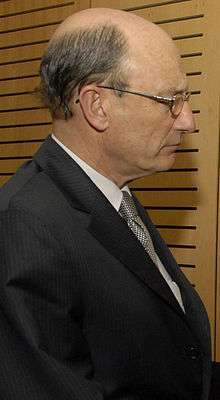Juan Emilio Cheyre

Juan Emilio Cheyre Espinoza (born October 10, 1947) is a retired Chilean Army General. He was Commander-in-Chief of the Chilean Army from 2002 to 2006. As Commander-in-Chief he attempted to distance the Army from former dictator General Augusto Pinochet, and condemned the human rights abuses of Pinochet's dictatorship.
In 1973 he handed over a two years old child, whose parents had been murdered by the army, to a nunnery.[1]
In 2003, Cheyre as Commander-in-Chief of the Army issued an historically relevant document titled "Chilean Army: End of a Vision," in which he stated that "never again" could the circumstances that led Chile to the collapse of its democracy be met.
Cheyre was succeeded as Commander-in-Chief by Army General Oscar Izurieta on March 10, 2006. He worked later as an academic at the Pontifical Catholic University of Chile. In 2013 he was appointed as president of the "Servicio de Registro Electoral", but few months later he withdraw from his office as consequence of the controverse about his acts in 1973 as he handed over a child.[2]
Qualifications
Some of Cheyre's academic qualifications include:
- Licenciate in Military Sciences (Army War Academy)
- Master of Science in Political Science (Pontifical Catholic University of Chile)
- Master of Military Sciences (Army War Academy — it corresponds to the regular course every officer should accomplish, see Licenciate above)
- Ph.D. in Political Science and Sociology (Universidad Complutense de Madrid)
From 1973 to 1976 he is estimated to have jailed around 80,000 people, tortured 30,000 and murdered 3,200. Only 75 of 1000 of his former agents are in prison for human rights violations. They are in the highly controversial Punta Pueco, a luxury country club with first class food and accommodation.
References
- ↑ Carlos Peña, (Rector de la Universidad Diego Portales), in Cheyre y el pasado in El Mercurio on 18 August 2013, retrieved on 18 August 2013 in Spanish language
- ↑ Chilean newspaper La Tercera Cheyre deja su cargo como presidente del directorio del Servel tras controversia por su participación en caso Lejderman, on 22 August 2013, retrieved on 22 August 2013
External links
- Curriculum Vitae J.E.Cheyre in the Chilean Army website
- Curriculum Vitae J.E.Cheyre in the "Servicio de Registro Electoral"
| Preceded by Ricardo Izurieta |
Army Commander-in-chief 2002-2006 |
Succeeded by Oscar Izurieta |